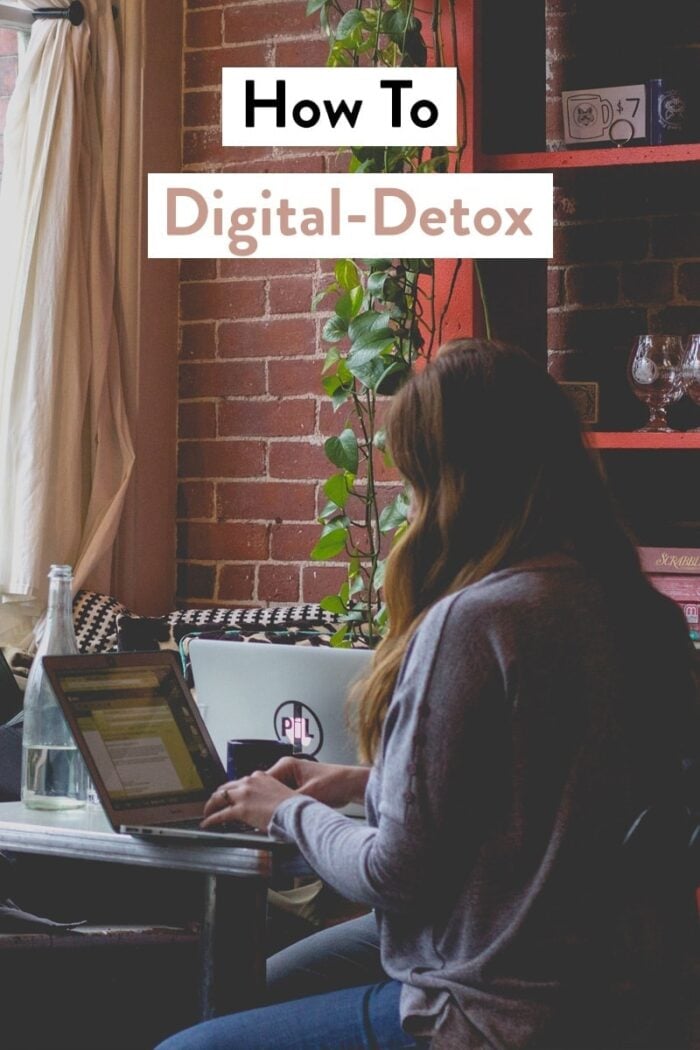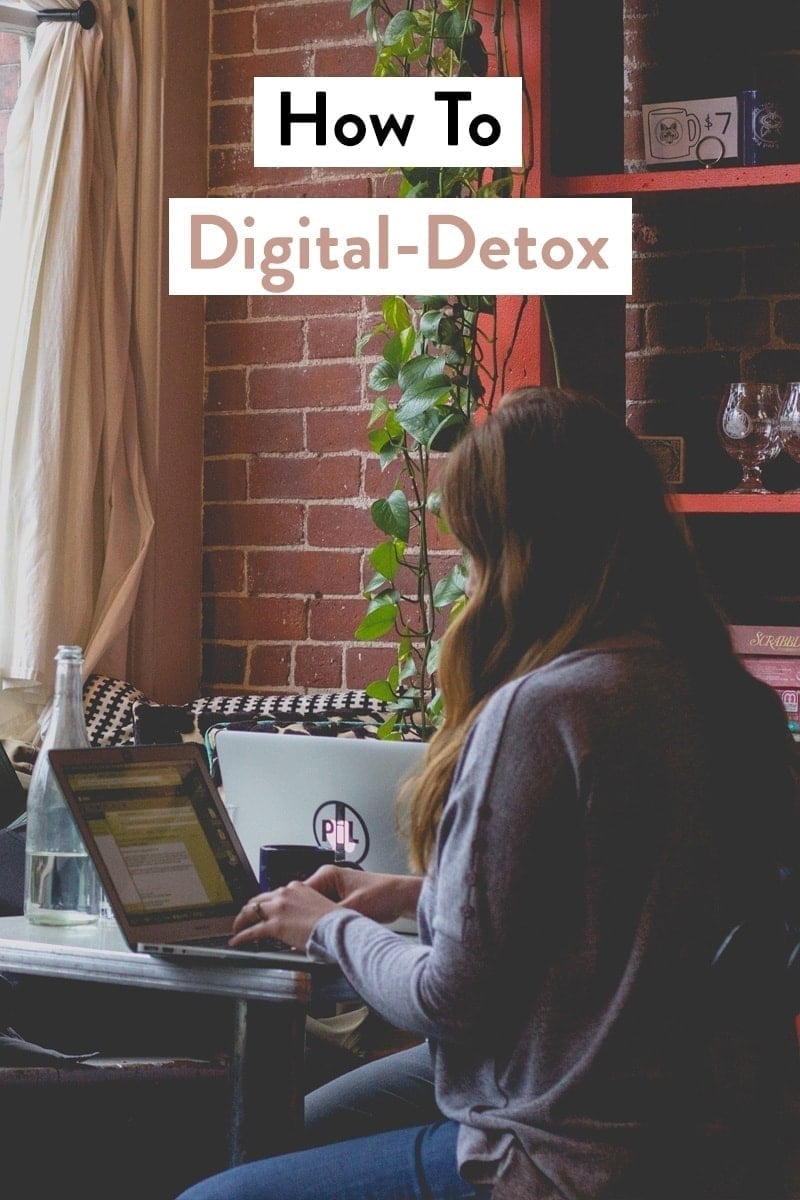This Post May Contain Affiliate Links. Please Read Our Disclosure Policy.
Unplugging from a perpetually plugged-in, completely connected world can seem daunting and downright impossible. While you may not be able to completely get rid of your tech, here are some great tips to digital detox and get you back to the “real” world.

First of all, let’s set the record straight — I am absolutely not saying, “phone bad, Amish-esque lifestyle good.” Let’s be real. Technology is awesome. It keeps us connected, informed, and entertained. There is nothing wrong with spending your downtime playing Candy Crush or browsing Instagram. The problem is that by overly focusing on our phones, computers, or televisions, we can become comparative (Facebook stalking your high school crush’s wife’s sister who is a supermodel and millionaire is probably not constructive), lethargic, and end up feeling disconnected.
It’s all about balance. It can be difficult to put down the phone when it’s pretty much the most convenient tool for busying your brain, so here are a few tips to help you get back to reality — without giving up Candy Crush.
Shut Down at Night
While checking Facebook or playing a game can seem like the perfect way to relax before bed, it can have negative effects on your sleep cycle. Blue light, which is what most digital devices display, actually suppresses the production of melatonin, the hormone your body uses to fall asleep. Set your phone to switch to “night shift” or “night mode” at sunset or a few hours before bedtime. This switches the blue light to a warmer color, helping get your brain ready for sleep. Experts also recommend no phone, computer, or television usage 30 minutes to an hour before bedtime. So no Sabrina before bed. You’ll thank me later.
Practice Mindfulness
Mindfulness, in its most simple definition, is the act of being in the present. It means to focus on your surroundings, the feeling of your body, and to what each sense is experiencing. It is akin to meditation. Staying in the moment can bring more joy and memorable experiences to your life.
The next time you are eating a meal, put your phone down. Like all the way down. In another room. Feel the weight of the utensil in your hand. Really taste your feed. Feel the texture, the temperature. If you are with others, focus on your conversation with them.
And, please, put DOWN the phone while at a concert, wedding, or other big events. Research has shown that you are more likely to remember an event if you’re not photographing it. Taking a picture may let your phone capture a moment, but your brain doesn’t. So, fully immerse yourself in the experience — but not through a lens.
Set (Realistic) Boundaries
While it may be impossible for you to turn off entirely when you are away from the office (or just away from your usual day-to-day), it is okay to set boundaries in place in order to go off-grid, may that be physically or just mentally. If being in-touch with work is integral to your position, let your coworkers know who to refer to for questions or concerns before they reach out to you. If you are going to spend time taking care of yourself (like a massage, haircut, or just a long drive), turn your phone on silent. Tell anyone who may need to get in touch with you that you will be disconnected for an hour. It can be hard to remind ourselves that we deserve alone time, so — if you can — enforce it. Both for others and yourself.
If you haven’t done this already, I highly recommend doing it now — set your phone to automatically go into “do not disturb” mode from bedtime to when your alarm goes off in the morning. Most phones will allow you to receive notifications from certain contacts during those hours or will allow notifications if someone calls you three times in a row. But that friend who texts at midnight about a show she’s watching? The coworker who has a non-urgent work question? Y’all can wait ’til morning.
Take a Break
Even if it’s just for an hour or two, give your mind and your tech a break. Putting your phone in a completely different room can keep you from thinking about it, especially if your mind is focused on other things, like a book, a movie, or even just another person.
Institute at least a couple of “tech-free” meals at home every week, if not every day. Studies have shown that families that sit down regularly for meals are closer and healthier. And, hello, I know a place where you can find some delicious things to cook!
Another option would be to (temporarily) delete distracting apps from your phone. If you find yourself spending hours upon hours on Facebook or Instagram, or find that you are feeling negative emotions after checking an app, it’s probably time to remove that app until a later date. No need to delete or deactivate an account — just remove the app. You can always add it back later, but it will keep you from mindlessly opening it and browsing.
If you are unable to completely remove an app, or if the site in question is accessible through an Internet browser, unsave your login info and password. This gives you a moment to think, “Do I really want to type this in? Is this really how I want to spend my time?” A lot of times the answer is “meh.”
Utilize Screen Time Settings
On an iPhone, in your settings, there is a section called “Screen Time.” It will show you the average amount of time you spend on your phone in a week. It’s slightly terrifying. (Or at least mine is.) Ask yourself, “What could I be doing in that time I’m spending on the phone?” Reading a book? Spending time with family? Ignoring the world to run into the forest and build a fort out of twigs?
You can also schedule “downtime,” where only certain apps are available at certain times. For instance, if you frequently find yourself up late looking at real estate apps and picking out houses you’d buy if you won the lottery (absolutely not me), it’d probably be a good idea to limit that particular app. You can also set time limits on apps so that you’re not spending hours on end looking at million-dollar homes (I promise it’s not me).

Taking a digital detox on a regular basis is so important for our mental health and general well-being. One study showed that teens are less happy with their lives the more social media they use. The World Health Organization literally classified “gaming disorder” as a mental health issue, and some experts believe tech addiction is soon to follow. Social media actually increases symptoms of loneliness.
But don’t feel like you have to run into the forest and build a fort out of twigs (I mean, you can if you want). Simply being cognizant of where we are, who we’re with, and what we have can make life so, so much better.
More On Health & Wellness
- 20 Self Care Ideas for a Healthy Happy You
- All About Chlorella
- One Day Detox
- Best 5 Adaptogens For Anxiety Relief And Stress Reduction
Hey – you’ve made it this far, and now we’re best friends! Make sure you follow me on Instagram, Pinterest, and Facebook, too!

















You’re so right Cheryl, we are all overloaded with technology. I try to do time blocking so I can focus on whatever task is going on at the moment. Also no phones at mealtime ever!
And although it sounds contradictory, I’m looking forward to hearing back from you on coaching.?